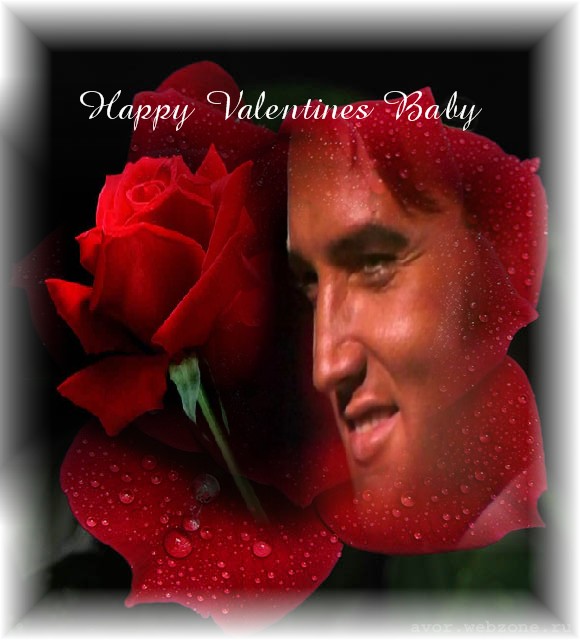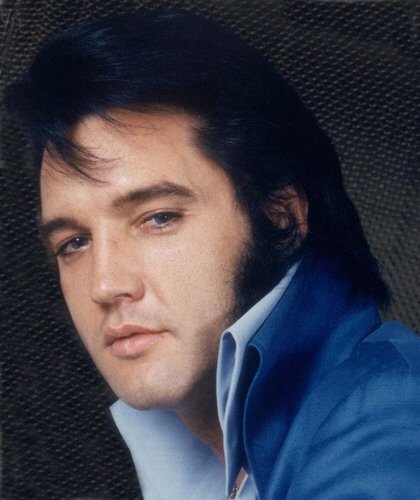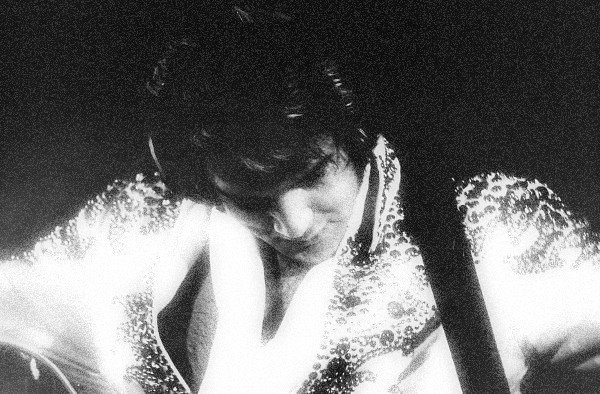




Elvis Aaron Presley (January 8, 1935 – August 16, 1977; middle name sometimes spelled Aron) was an American singer and actor. A cultural icon, he is commonly known simply as Elvis and is also sometimes referred to as The King of Rock 'n' Roll or The King.
Presley began his career in 1954 as one of the first performers of rockabilly, an uptempo fusion of country and rhythm and blues with a strong back beat. His novel versions of existing songs, mixing "black" and "white" sounds, made him popular—and controversial—as did his uninhibited stage and television performances. Presley had a versatile voice and he had unusually wide success encompassing many genres, including rock and roll, gospel, blues, country, ballads and pop. To date, he has been inducted into four music halls of fame. In the 1960s, Presley made the majority of his 31 movies, most of which were poorly reviewed but financially successful musicals. In 1968, he returned to live performances in a television special, which led to a string of successful tours across the U.S., notably in Las Vegas, for the remainder of his career. In 1973, Presley staged the first global live concert via satellite (Aloha from Hawaii), reaching at least one billion viewers live and an additional 500 million on delay. Throughout his career, he set records for concert attendance, television ratings and recordings sales. He is one of the best-selling solo artists in the history of music, selling over one billion records worldwide, and he is regarded as one of the most important figures of twentieth century popular culture. Among his many awards and accolades are 14 Grammy nominations (3 wins) from the National Academy of Recording Arts & Sciences, the Grammy Lifetime Achievement Award, which he received at age 36, and being named One of the Ten Outstanding Young Men of the Nation for 1970 by the United States Jaycees.
Health problems, prescription drug dependence, and other factors led to his death at age 42.
Presley began his career in 1954 as one of the first performers of rockabilly, an uptempo fusion of country and rhythm and blues with a strong back beat. His novel versions of existing songs, mixing "black" and "white" sounds, made him popular—and controversial—as did his uninhibited stage and television performances. Presley had a versatile voice and he had unusually wide success encompassing many genres, including rock and roll, gospel, blues, country, ballads and pop. To date, he has been inducted into four music halls of fame. In the 1960s, Presley made the majority of his 31 movies, most of which were poorly reviewed but financially successful musicals. In 1968, he returned to live performances in a television special, which led to a string of successful tours across the U.S., notably in Las Vegas, for the remainder of his career. In 1973, Presley staged the first global live concert via satellite (Aloha from Hawaii), reaching at least one billion viewers live and an additional 500 million on delay. Throughout his career, he set records for concert attendance, television ratings and recordings sales. He is one of the best-selling solo artists in the history of music, selling over one billion records worldwide, and he is regarded as one of the most important figures of twentieth century popular culture. Among his many awards and accolades are 14 Grammy nominations (3 wins) from the National Academy of Recording Arts & Sciences, the Grammy Lifetime Achievement Award, which he received at age 36, and being named One of the Ten Outstanding Young Men of the Nation for 1970 by the United States Jaycees.
Health problems, prescription drug dependence, and other factors led to his death at age 42.
Early Life in Tupelo
Elvis Presley owed his ancestry to diverse European ethnic strains, primarily British and German; Presley's lineage also included some Cherokee descent. His father, Vernon Elvis Presley (April 10, 1916 – June 26, 1979), and his mother, Gladys Love Smith (April 25, 1912 – August 14, 1958) met in Tupelo, Mississippi, and eloped to Pontotoc County where they married on June 17, 1933.
Presley was born in a two-room shotgun house, built by his father, in East Tupelo. He was an identical twin; his brother was stillborn and given the name Jesse Garon. Growing up as an only child he "was, everyone agreed, unusually close to his mother." The family lived just above the poverty line and attended an Assembly of God church. Vernon has been described as "a malingerer, always averse to work and responsibility." although there is some documented evidence of work he took throughout the depression. His wife was "voluble, lively, full of spunk" and had a fondness for drink. In 1938, Vernon, along with Gladys' brother Travis Smith and a friend Lether Gable, was jailed for an eight dollar check forgery. During his eight-month incarceration, Gladys and her son lost the family home, and they moved in with relatives. In September 1942, Presley entered first grade at Lawhorn School in Tupelo. He was considered a "well-mannered and quiet child", but sometimes classmates threw "things at him — rotten fruit and stuff — because he was different... he stuttered and he was a mama's boy." During his earliest years, Presley would find his initial musical influences which originated from his family's attendance at the Assembly of God Church. Rolling Stone wrote: "Gospel pervaded Elvis' character and was a defining and enduring influence all of his days." Presley himself stated that gospel music became an important part of his life: "it was as natural as dancing, a way to escape from the problems." Throughout his life—in the recording studio, in private, or after concerts—Presley joined with others singing and playing gospel music at informal sessions.First public performances
On October 3, 1945, he made his first public performance in a singing contest at the Mississippi-Alabama Fair and Dairy Show at the suggestion of his teacher, Mrs. J.C. Grimes. Dressed as a cowboy, Presley had to stand on a chair to reach the microphone and sang Red Foley's "Old Shep." He came in fifth, winning $5 and a free ticket to all the Fair rides. A few months later, for his eleventh birthday, Presley received his first guitar. He had wanted a rifle but his parents could only afford a guitar. Over the following year, Vernon's brother, Vester, gave Elvis basic guitar lessons. The young Presley frequently listened to Mississippi Slim’s radio show on Tupelo’s WELO. Before he was a teenager, music was already his "consuming passion". In 1947, Mississippi Slim, one of Presley's earliest musical heroes, agreed to let Elvis sing on two occasions. However, the first time, Presley got such stage fright that he couldn't go on. He did manage to go on the following week.
Move to Memphis
In September 1948, the family (along with Gladys' brother and his family moved to Memphis, Tennessee, allegedly because Vernon—in addition to needing work—had to escape the law for transporting bootleg liquor. They found a home first at 370 Washington Street; a boarding house where they shared their bathroom with three other families, and then Adams Street. After applying for welfare assistance and receiving a visit from a Memphis Housing Authority inspector in 1949, who noted that they had "..no privacy..", the family were moved to Lauderdale Courts, a public housing development in one of Memphis' poorer sections. Presley practiced playing guitar in the laundry room and also played in a five-piece band with other tenants. One resident, another future rockabilly pioneer, Johnny Burnette, recalled, "Wherever Elvis went he'd have his guitar slung across his back... [H]e'd go in to one of the cafes or bars... Then some folks would say: 'Let's hear you sing, boy.'" Presley enrolled at L. C. Humes High School where some fellow students viewed his performing unfavorably; one recalled that he was "a sad, shy, not especially attractive boy" whose guitar playing was not likely to win any prizes. Presley was made fun of as a "trashy" kind of boy, playing "trashy" hillbilly music." Other children however, "would beg him" to sing, but he was apparently too shy to perform. In September 1950, Presley occasionally worked evenings as an usher at Loew's State Theater—his first job—to boost the family income, but his mother made him quit as she feared it was affecting his school work. He worked again at Loew's in June the following year, but was fired after a fistfight over a female employee. He began to grow his sideburns and, when he could afford to, dress in the wild, flashy clothes of Lansky Brothers on Beale Street. He stood out, especially in the conservative Deep South of the 1950s, and was mocked and bullied for it. Childhood friend Red West said: "In the sea of 1600 pink-scalped kids at school, Elvis stood out like a camel in the arctic. ... [but] ... his appearance expressed a defiance which his demeanor did not match..." Despite any unpopularity or shyness, he was a contestant in his school's 1952 "Annual Minstrel Show" and won by receiving the most applause. His prize was to sing encores, including "Cold Cold Icy Fingers" and "Till I Waltz Again With You". After graduation, Presley was still a rather shy "kid who had spent scarcely a night away from home." His third job was driving a truck for the Crown Electric Company. He began wearing his hair longer with a ducktail; the style of truck drivers at that time.
In September 1948, the family (along with Gladys' brother and his family moved to Memphis, Tennessee, allegedly because Vernon—in addition to needing work—had to escape the law for transporting bootleg liquor. They found a home first at 370 Washington Street; a boarding house where they shared their bathroom with three other families, and then Adams Street. After applying for welfare assistance and receiving a visit from a Memphis Housing Authority inspector in 1949, who noted that they had "..no privacy..", the family were moved to Lauderdale Courts, a public housing development in one of Memphis' poorer sections. Presley practiced playing guitar in the laundry room and also played in a five-piece band with other tenants. One resident, another future rockabilly pioneer, Johnny Burnette, recalled, "Wherever Elvis went he'd have his guitar slung across his back... [H]e'd go in to one of the cafes or bars... Then some folks would say: 'Let's hear you sing, boy.'" Presley enrolled at L. C. Humes High School where some fellow students viewed his performing unfavorably; one recalled that he was "a sad, shy, not especially attractive boy" whose guitar playing was not likely to win any prizes. Presley was made fun of as a "trashy" kind of boy, playing "trashy" hillbilly music." Other children however, "would beg him" to sing, but he was apparently too shy to perform. In September 1950, Presley occasionally worked evenings as an usher at Loew's State Theater—his first job—to boost the family income, but his mother made him quit as she feared it was affecting his school work. He worked again at Loew's in June the following year, but was fired after a fistfight over a female employee. He began to grow his sideburns and, when he could afford to, dress in the wild, flashy clothes of Lansky Brothers on Beale Street. He stood out, especially in the conservative Deep South of the 1950s, and was mocked and bullied for it. Childhood friend Red West said: "In the sea of 1600 pink-scalped kids at school, Elvis stood out like a camel in the arctic. ... [but] ... his appearance expressed a defiance which his demeanor did not match..." Despite any unpopularity or shyness, he was a contestant in his school's 1952 "Annual Minstrel Show" and won by receiving the most applause. His prize was to sing encores, including "Cold Cold Icy Fingers" and "Till I Waltz Again With You". After graduation, Presley was still a rather shy "kid who had spent scarcely a night away from home." His third job was driving a truck for the Crown Electric Company. He began wearing his hair longer with a ducktail; the style of truck drivers at that time.
Early musical Influences
In Memphis, Presley went to record stores that had jukeboxes and listening booths. He knew all of Hank Snow’s songs and he loved records by Sister Rosetta Tharpe, Roy Acuff, Ernest Tubb, Ted Daffan, Jimmie Rodgers, Jimmie Davis and Bob Wills." He was also an audience member at the all-night white—and black—"gospel sings" downtown. The region's radio stations played "race records" featuring music that became known as rhythm and blues. Memphis had a strong tradition of blues music and Presley frequented blues as well as hillbilly venues. Many of his future recordings were inspired by local African American composers and recording artists, including Arthur Crudup and Rufus Thomas. B.B. King has recalled that he knew Presley before he was popular when they both used to frequent Beale Street. Presley "was an untrained musician who played [guitar and piano] entirely by ear. 'I don't read music,' he confessed, 'but I know what I like.' ... Because he was not a songwriter, Presley [would] rarely [have] material prepared for recording sessions..." When later, as a young singer, he "ventured into the recording studio he was still heavily influenced by the songs he had heard on the jukebox and radio."
By that time Presley had also separated himself from others by his changing appearance (sideburns, long hair, flashy clothes) and he seems to have singled music out as his future.
Sun Records 1953-1955
On July 18, 1953, Presley went to Sun Records' Memphis Recording Service to record "My Happiness" with "That's When Your Heartaches Begin," supposedly as a present for his mother although it was months after her birthday. Below is an excerpt of his initial conversation between Elvis and Sam Phillips' assistant, Marion Keisker: "What kind of singer are you?" He responded instantly, "I sing all kinds." "Who do you sound like?" she persisted. "I don't sound like nobody," was his response. After his demo, she made herself a note: "Good ballad singer, Hold."
On January 4, 1954, he cut a second acetate demo recording of "I'll Never Stand In Your Way" and "It Wouldn't Be The Same Without You". At the time, Sun Records boss Sam Phillips was on the lookout for someone who could deliver a blend of black blues and boogie-woogie music; he thought it would be very popular among white people. When Phillips acquired a demo recording of "Without You" and was unable to identify the vocalist, Marion Keisker reminded him about the young truck driver. She called him on June 26, 1954. However, Presley was not able to do justice to the song. Phillips would later recall that "Elvis was probably as nervous as anybody, black or white, that I had seen in front of a microphone." Despite this, Phillips invited local musicians Winfield "Scotty" Moore and Bill Black to audition Presley. Though they were not overly impressed, a studio session was planned.
During a recording break, Presley began "acting the fool" first with Arthur Crudup's "That's All Right (Mama)". Phillips quickly got them all to restart, and began taping. This was the sound he had been looking for. The group recorded other songs, including Bill Monroe's "Blue Moon of Kentucky." Scotty Moore recalls that after the session Bill Black remarked: "Damn. Get that on the radio and they'll run us out of town." That's All Right" was aired on July 8, 1954, by DJ Dewey Phillips on his Red, Hot and Blue show. Listeners to the show began phoning in, eager to find out who the singer was The interest was such that Phillips played the demo fourteen times. During an interview on the show, Phillips asked Presley what high school he attended—to clarify Presley's color for listeners who assumed he must be black. Moore and Black began playing regularly with Presley. They gave performances on July 17 and July 24, 1954 to promote the Sun single at the Bon Air, a rowdy music club in Memphis, where the band was not well-received. On July 30 the trio, billed as The Blue Moon Boys, made their first paid appearance at the Overton Park Shell, with Slim Whitman headlining. With a natural feel for rhythm, Presley's shook his legs when performing: his wide-legged pants emphasizing his leg movements, apparently causing females in the audience to go "crazy." Presley was aware of the cause of the audience's reaction and consciously incorporated similar movements into future shows. Deejay and promoter Bob Neal became the trio's manager (replacing Scotty Moore). Moore and Black left their band, the Starlight Wranglers and, from August through October 1954, appeared with Presley at The Eagle's Nest. Presley debuted at the Grand Ole Opry in Nashville on October 2; Hank Snow introduced Presley on stage. He performed "Blue Moon of Kentucky" but received only a polite response. Afterwards, the singer was supposedly told by the Opry's Jim Denny: "Boy, you’d better keep driving that truck," though others deny it was Denny who made that statement. Country music promoter and manager Tillman Franks booked Presley for October 16 on KWKH-AM's Louisiana Hayride. Before Franks saw Presley, he referred to him as "that new black singer with the funny name." During Presley's first set, the reaction was muted; Franks then advised Presley to "Let it all go!" for the second set. House drummer D.J. Fontana (who had worked in strip clubs) complemented Presley's movements with accented beats. Bill Black also took an active part in encouraging the audience, and the crowd became more responsive. According to one source, regarding Presley's engagements from that time, "Audiences had never before heard [such] music... [or] seen anyone who performed like Presley either. The shy, polite, mumbling boy gained self-confidence with every appearance... People watching the show were astounded and shocked, both by the ferocity of his performance, and the crowd’s reaction to it....Roy Orbison saw Presley for the first time in Odessa, Texas: 'His energy was incredible, his instinct was just amazing... I just didn’t know what to make of it. There was just no reference point in the culture to compare it.'" Sam Phillips said Presley "put every ounce of emotion ... into every song, almost as if he was incapable of holding back."
By August 1955, Sun Studios had released ten sides, credited to "Elvis Presley, Scotty and Bill," all typical of the developing Presley style which seemed hard to categorize; he was billed or labeled in the media as "The King of Western Bop," "The Hillbilly Cat" and "The Memphis Flash."
On July 18, 1953, Presley went to Sun Records' Memphis Recording Service to record "My Happiness" with "That's When Your Heartaches Begin," supposedly as a present for his mother although it was months after her birthday. Below is an excerpt of his initial conversation between Elvis and Sam Phillips' assistant, Marion Keisker: "What kind of singer are you?" He responded instantly, "I sing all kinds." "Who do you sound like?" she persisted. "I don't sound like nobody," was his response. After his demo, she made herself a note: "Good ballad singer, Hold."
On January 4, 1954, he cut a second acetate demo recording of "I'll Never Stand In Your Way" and "It Wouldn't Be The Same Without You". At the time, Sun Records boss Sam Phillips was on the lookout for someone who could deliver a blend of black blues and boogie-woogie music; he thought it would be very popular among white people. When Phillips acquired a demo recording of "Without You" and was unable to identify the vocalist, Marion Keisker reminded him about the young truck driver. She called him on June 26, 1954. However, Presley was not able to do justice to the song. Phillips would later recall that "Elvis was probably as nervous as anybody, black or white, that I had seen in front of a microphone." Despite this, Phillips invited local musicians Winfield "Scotty" Moore and Bill Black to audition Presley. Though they were not overly impressed, a studio session was planned.
During a recording break, Presley began "acting the fool" first with Arthur Crudup's "That's All Right (Mama)". Phillips quickly got them all to restart, and began taping. This was the sound he had been looking for. The group recorded other songs, including Bill Monroe's "Blue Moon of Kentucky." Scotty Moore recalls that after the session Bill Black remarked: "Damn. Get that on the radio and they'll run us out of town." That's All Right" was aired on July 8, 1954, by DJ Dewey Phillips on his Red, Hot and Blue show. Listeners to the show began phoning in, eager to find out who the singer was The interest was such that Phillips played the demo fourteen times. During an interview on the show, Phillips asked Presley what high school he attended—to clarify Presley's color for listeners who assumed he must be black. Moore and Black began playing regularly with Presley. They gave performances on July 17 and July 24, 1954 to promote the Sun single at the Bon Air, a rowdy music club in Memphis, where the band was not well-received. On July 30 the trio, billed as The Blue Moon Boys, made their first paid appearance at the Overton Park Shell, with Slim Whitman headlining. With a natural feel for rhythm, Presley's shook his legs when performing: his wide-legged pants emphasizing his leg movements, apparently causing females in the audience to go "crazy." Presley was aware of the cause of the audience's reaction and consciously incorporated similar movements into future shows. Deejay and promoter Bob Neal became the trio's manager (replacing Scotty Moore). Moore and Black left their band, the Starlight Wranglers and, from August through October 1954, appeared with Presley at The Eagle's Nest. Presley debuted at the Grand Ole Opry in Nashville on October 2; Hank Snow introduced Presley on stage. He performed "Blue Moon of Kentucky" but received only a polite response. Afterwards, the singer was supposedly told by the Opry's Jim Denny: "Boy, you’d better keep driving that truck," though others deny it was Denny who made that statement. Country music promoter and manager Tillman Franks booked Presley for October 16 on KWKH-AM's Louisiana Hayride. Before Franks saw Presley, he referred to him as "that new black singer with the funny name." During Presley's first set, the reaction was muted; Franks then advised Presley to "Let it all go!" for the second set. House drummer D.J. Fontana (who had worked in strip clubs) complemented Presley's movements with accented beats. Bill Black also took an active part in encouraging the audience, and the crowd became more responsive. According to one source, regarding Presley's engagements from that time, "Audiences had never before heard [such] music... [or] seen anyone who performed like Presley either. The shy, polite, mumbling boy gained self-confidence with every appearance... People watching the show were astounded and shocked, both by the ferocity of his performance, and the crowd’s reaction to it....Roy Orbison saw Presley for the first time in Odessa, Texas: 'His energy was incredible, his instinct was just amazing... I just didn’t know what to make of it. There was just no reference point in the culture to compare it.'" Sam Phillips said Presley "put every ounce of emotion ... into every song, almost as if he was incapable of holding back."
By August 1955, Sun Studios had released ten sides, credited to "Elvis Presley, Scotty and Bill," all typical of the developing Presley style which seemed hard to categorize; he was billed or labeled in the media as "The King of Western Bop," "The Hillbilly Cat" and "The Memphis Flash."
Signing to RCA
On August 15, 1955, "Colonel" Tom Parker became Presley's manager, signing him to a one year contract, plus renewals. Several record labels had shown interest in signing Presley and, by the end of October 1955, three major labels had made offers up to $25,000. On November 21, 1955, Parker and Phillips negotiated a deal with RCA Victor Records to acquire Presley's Sun contract for an unprecedented $40,000, $5,000 of which was a bonus for the singer for back royalties owed to him by Sun Records (Presley, at 20, was officially still a minor, so his father had to sign the contract). To boost earnings for himself and Presley, Parker also cut a deal with Hill and Range Publishing Company to create two separate entities—"Elvis Presley Music, Inc" and "Gladys Music"—to handle all of Presley's songs and accrued royalties. The owners of Hill & Range, Julian and Jean Aberbach, agreed to split the publishing and royalties rights of each song equally with Presley. Hill & Range, Presley or Colonel Parker's partners then had to convince unsecured songwriters that it was worthwhile for them to give up one third of their due royalties in exchange for Presley recording their compositions. One result of these dealings was the appearance of Presley's name as co-writer of some songs he recorded, even though Presley never had any hand in the songwriting process. The only known exception to this rule is Heartbreak Hotel, where Presley received writing credits because Mae Boren Axton knew of his wish to buy his parents a Cadillac. Because she liked Presley so much, she offered him writing credits to help him raise the funds quicker. By December 1955, RCA had begun to heavily promote its newest star, and by the month's end had re-released all of his Sun recordings.
On August 15, 1955, "Colonel" Tom Parker became Presley's manager, signing him to a one year contract, plus renewals. Several record labels had shown interest in signing Presley and, by the end of October 1955, three major labels had made offers up to $25,000. On November 21, 1955, Parker and Phillips negotiated a deal with RCA Victor Records to acquire Presley's Sun contract for an unprecedented $40,000, $5,000 of which was a bonus for the singer for back royalties owed to him by Sun Records (Presley, at 20, was officially still a minor, so his father had to sign the contract). To boost earnings for himself and Presley, Parker also cut a deal with Hill and Range Publishing Company to create two separate entities—"Elvis Presley Music, Inc" and "Gladys Music"—to handle all of Presley's songs and accrued royalties. The owners of Hill & Range, Julian and Jean Aberbach, agreed to split the publishing and royalties rights of each song equally with Presley. Hill & Range, Presley or Colonel Parker's partners then had to convince unsecured songwriters that it was worthwhile for them to give up one third of their due royalties in exchange for Presley recording their compositions. One result of these dealings was the appearance of Presley's name as co-writer of some songs he recorded, even though Presley never had any hand in the songwriting process. The only known exception to this rule is Heartbreak Hotel, where Presley received writing credits because Mae Boren Axton knew of his wish to buy his parents a Cadillac. Because she liked Presley so much, she offered him writing credits to help him raise the funds quicker. By December 1955, RCA had begun to heavily promote its newest star, and by the month's end had re-released all of his Sun recordings.
First recordings for RCA
On January 10, 1956, Presley made his first recordings for RCA in Nashville, Tennessee. Despite Scotty, Bill and D.J. being in the studio with him, RCA enlisted the talents of already established stars Floyd Cramer and Chet Atkins also to "...fatten the sound." The session produced "Heartbreak Hotel/I Was The One" which was released on January 27. The public reaction to "Heartbreak Hotel" prompted RCA to release it as a single in its own right (February 11). By April it had hit number one in the U.S. charts, selling in excess of one million copies.
On January 10, 1956, Presley made his first recordings for RCA in Nashville, Tennessee. Despite Scotty, Bill and D.J. being in the studio with him, RCA enlisted the talents of already established stars Floyd Cramer and Chet Atkins also to "...fatten the sound." The session produced "Heartbreak Hotel/I Was The One" which was released on January 27. The public reaction to "Heartbreak Hotel" prompted RCA to release it as a single in its own right (February 11). By April it had hit number one in the U.S. charts, selling in excess of one million copies.
National Exposure
On March 3, 1955, Presley made his first television appearance on the TV version of Louisiana Hayride on KSLA-TV, but failed an audition for Arthur Godfrey's Talent Scouts on CBS-TV later that month. To increase the singer's exposure, Parker finally brought Presley to national television after booking six appearances on CBS's Stage Show in New York, beginning January 28, 1956. Presley was introduced on the first program by Cleveland DJ Bill Randle. He stayed in town and on January 30, he and the band headed for the RCA's New York Studio.[86] The sessions yielded eight songs, including "My Baby Left Me" and "Blue Suede Shoes". The latter was the only hit single from the collection, but the recordings marked the point at which Presley started moving away from the raw, pure Sun sound to the more commercial and mainstream sound RCA had envisioned for him.
Debut album and Hollywood
On March 23, RCA Victor released Elvis Presley, his first album. Like the Sun recordings, the majority of the tracks were country songs. The album went on to top the pop album chart for 10 weeks and became RCA's first million-dollar seller.
On April 1, Presley launched his acting career with a screen test for Paramount Pictures. His first motion picture, Love Me Tender, was released on November 21.
TO BE CONTINUED:





%5B1%5D.jpg)








No comments:
Post a Comment